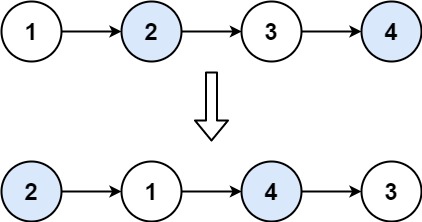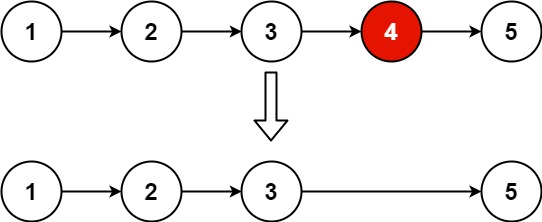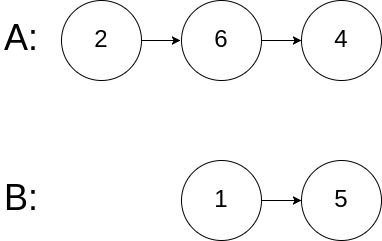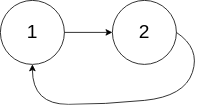Leetcode Day 4 - Advanced Linked List Operations
Focuses on more complex linked list problems, such as swapping nodes in pairs, removing nodes from specific positions, detecting intersections between two lists, and identifying cycles within a linked list, requiring advanced pointer manipulation and boundary case handling.
Linked List 21
| Diff | Problem | Python | C++ |
|---|---|---|---|
 | 24 Swap Nodes in Pairs | ✅ | ✅ |
 | 19 Remove Nth Node From End of List | ✅ | |
 | 160 Intersection of Two Linked Lists | ✅ | |
 | 142 Linked List Cycle II | ✅ |
Swap Nodes in Pairs
Given a linked list, swap every two adjacent nodes and return its head. You must solve the problem without modifying the values in the list’s nodes (i.e., only nodes themselves may be changed.)
Example 1
1
2
Input: head = [1,2,3,4]
Output: [2,1,4,3]
Example 2
1
2
Input: head = []
Output: []
Example 3
1
2
Input: head = [1]
Output: [1]
Solution3
Python
1
2
3
4
5
6
7
8
9
10
11
12
13
14
15
16
17
18
19
20
21
22
23
class Solution(object):
def swapPairs(self, head):
if head is None or head.next is None:
return head
odd = head
even = head.next
old = None
while((even is not None) and (odd is not None)):
odd.next = even.next
even.next = odd
if old is not None:
old.next = even
else:
head = even
old = odd
odd = odd.next
if odd is not None:
even = odd.next
return head
C++
1
2
3
4
5
6
7
8
9
10
11
12
13
14
15
16
17
18
19
20
21
22
class Solution {
public:
ListNode* swapPairs(ListNode* head) {
ListNode dummy(0);
dummy.next = head;
ListNode* prev = &dummy;
while (prev->next && prev->next->next) {
ListNode* first = prev->next;
ListNode* second = first->next;
first->next = second->next;
second->next = first;
prev->next = second;
prev = first;
}
return dummy.next;
}
};
Similar Questions
| Diff | Similar Questions | Python | Java |
|---|---|---|---|
 | 1721 Swapping Nodes in a Linked List4 | ||
 | 25 Reverse Nodes in k-Group5 |
Remove Nth Node From End of List
Given the head of a linked list, remove the nth node from the end of the list and return its head.
Example 1
1
2
Input: head = [1,2,3,4,5], n = 2
Output: [1,2,3,5]
Example 2
1
2
Input: head = [1], n = 1
Output: []
Example 3
1
2
Input: head = [1,2], n = 1
Output: [1]
Solution7
Python
1
2
3
4
5
6
7
8
9
10
11
12
13
14
15
16
17
18
19
20
class Solution(object):
def removeNthFromEnd(self, head, n):
cur = head
dummy = ListNode(0)
dummy.next = head
prev = dummy
nth = cur
i = 1
while cur.next is not None:
if i == n:
prev = nth
nth = nth.next
else:
i += 1
cur = cur.next
prev.next = nth.next
return dummy.next
Similar Questions
| Diff | Similar Questions | Python | Java |
|---|---|---|---|
 | 2095 Delete the Middle Node of a Linked List8 |
Intersection of Two Linked Lists
Given the heads of two singly linked-lists headA and headB, return the node at which the two lists intersect. If the two linked lists have no intersection at all, return null.
For example, the following two linked lists begin to intersect at node c1:
The test cases are generated such that there are no cycles anywhere in the entire linked structure.
Note that the linked lists must retain their original structure after the function returns.
Example 1:
1
2
Input: intersectVal = 8, listA = [4,1,8,4,5], listB = [5,6,1,8,4,5], skipA = 2, skipB = 3
Output: Intersected at '8'
Example 2
1
2
Input: intersectVal = 0, listA = [2,6,4], listB = [1,5], skipA = 3, skipB = 2
Output: No intersection
Solution10
Python
1
2
3
4
5
6
7
8
9
10
11
12
13
14
15
16
17
18
19
20
21
22
23
24
class Solution(object):
def getIntersectionNode(self, headA, headB):
pA = headA
pB = headB
noneA = True
noneB = True
while(pA != pB):
if(pA.next is not None):
pA = pA.next
elif(noneA):
pA = headB
noneA = False
else:
return None
if(pB.next is not None):
pB = pB.next
elif(noneB):
pB = headA
noneB = False
else:
return None
return pA
Similar Questions
| Diff | Similar Questions | Python | Java |
|---|---|---|---|
 | 599 Minimum Index Sum of Two Lists11 |
Linked List Cycle II
Given the head of a linked list, return the node where the cycle begins. If there is no cycle, return null.
There is a cycle in a linked list if there is some node in the list that can be reached again by continuously following the next pointer. Internally, pos is used to denote the index of the node that tail’s next pointer is connected to (0-indexed). It is -1 if there is no cycle. Note that pos is not passed as a parameter.
Do not modify the linked list.
Example 1
1
2
3
Input: head = [3,2,0,-4], pos = 1
Output: tail connects to node index 1
Explanation: There is a cycle in the linked list, where tail connects to the second node.
Example 2
1
2
3
Input: head = [1,2], pos = 0
Output: tail connects to node index 0
Explanation: There is a cycle in the linked list, where tail connects to the first node.
Example 3
1
2
3
Input: head = [1], pos = -1
Output: no cycle
Explanation: There is no cycle in the linked list.
Solution13
Python
1
2
3
4
5
6
7
8
9
10
11
12
13
14
15
16
17
18
19
20
21
22
class Solution(object):
def detectCycle(self, head):
if head is None:
return None
fast, slow = head, head
while(fast is not None and fast.next is not None):
fast = fast.next.next
slow = slow.next
if(fast == slow):
break
if(fast is None or fast.next is None):
return None
fast = head
while(fast != slow):
fast = fast.next
slow = slow.next
return fast
Similar Questions
| Diff | Similar Questions | Python | Java |
|---|---|---|---|
 | 287 Find the Duplicate Number14 |
Reference
代码随想录-链表理论基础: https://programmercarl.com/链表理论基础.html ↩︎
Leetcode-24 Swap Nodes in Pairs: https://leetcode.com/problems/swap-nodes-in-pairs/description/ ↩︎
代码随想录-两两交换链表中的节点: https://programmercarl.com/0024.两两交换链表中的节点.html. ↩︎
Leetcode-1721 Swapping Nodes in a Linked List: https://leetcode.com/problems/swapping-nodes-in-a-linked-list/description/. ↩︎
Leetcode-25 Reverse Nodes in k-Group: https://leetcode.com/problems/reverse-nodes-in-k-group/. ↩︎
Leetcode-19 Remove Nth Node From End of List: https://leetcode.com/problems/remove-nth-node-from-end-of-list/description/. ↩︎
代码随想录-删除链表的倒数第N个节点: https://programmercarl.com/0019.删除链表的倒数第N个节点.html. ↩︎
Leetcode-2095 Delete the Middle Node of a Linked List: https://leetcode.com/problems/delete-the-middle-node-of-a-linked-list/. ↩︎
Leetcode-160 Intersection of Two Linked Lists: https://leetcode.com/problems/intersection-of-two-linked-lists/description/. ↩︎
代码随想录-面试题 02.07. 链表相交: https://programmercarl.com/面试题02.07.链表相交.html. ↩︎
Leetcode-599 Minimum Index Sum of Two Lists: https://leetcode.com/problems/minimum-index-sum-of-two-lists/. ↩︎
Leetcode-142 Linked List Cycle II: https://leetcode.com/problems/linked-list-cycle-ii/description/. ↩︎
代码随想录-环形链表II:https://programmercarl.com/0142.环形链表II.html. ↩︎
Leetcode-287 Find the Duplicate Number: https://leetcode.com/problems/find-the-duplicate-number/. ↩︎







